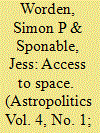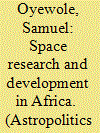| Srl | Item |
| 1 |
ID:
072005


|
|
|
|
|
| Publication |
2006.
|
| Summary/Abstract |
The United States (US) launch infrastructure is at a crisis point. Human access to space embodied in the Space Shuttle is due to be phased out by 2010. Currently, there are no heavy lift, 100 ton class launchers to support the US national vision for space exploration. Medium and large expendable launch providers, Boeing's Delta IV, and Lockheed-Martin's Atlas V Evolved Expendable Launch Vehicles are so expensive that the Delta no longer carries commercial payloads and the Atlas is unlikely to show significant growth without equally significant cost reductions and commercial traffic growth. This set of circumstances questions US dependence on these launch vehicles for national security purposes. High cost growth also exists with small launch vehicles, such as Pegasus, and the promising new field of small and microsatellites is little developed in the US, while foreign efforts, particularly European, are expanding largely on the availability of low-cost Russian boosters. One bright point is the emerging private sector, which is initially pursuing suborbital or small lift capabilities. Although such vehicles support very limited US Department of Defense or National Aeronautics and Space Administration spaceflight needs, they do offer potential technology demonstration stepping stones to more capable systems needed in the future of both agencies. This article outlines the issues and potential options for the US Government to address these serious shortcomings.
|
|
|
|
|
|
|
|
|
|
|
|
|
|
|
|
| 2 |
ID:
171573


|
|
|
| 3 |
ID:
114245


|
|
|
|
|
| Publication |
2012.
|
| Summary/Abstract |
International security concerns about ballistic missile proliferation have frequently highlighted the links between ballistic missiles and space launch vehicles. This article examines the extent of these links through a comprehensive survey of ballistic missile and space rocket programs in regional powers. It notes that missiles were derived from existing space launchers in just a small fraction of these cases. In a slightly greater fraction, space launchers were drawn from existing missile programs. This analysis suggests that though security concerns about space launchers being used as ballistic missiles are valid, the reverse trend, that of ballistic missiles being used as space launch vehicles, cannot be ignored. At the same time, as long as regional powers are limited to short-range and medium-range systems, their missile and space projects would only raise limited missile proliferation and space security concerns.
|
|
|
|
|
|
|
|
|
|
|
|
|
|
|
|
| 4 |
ID:
071181


|
|
|
| 5 |
ID:
154962


|
|
|
|
|
| Summary/Abstract |
Africa is advancing in research and development (R&D) in space with a growing investment in satellites for communications and Earth observations, astronomical observatories, space launch vehicles, and ballistic missiles. These efforts are designed to develop capacity in space science and to advance human development and security in Africa. Nevertheless, there are emerging concerns within and outside the continent on the cost of R&D in space and the public priority it is receiving, given developmental priorities in Africa. This article examines the state of space-related R&D in Africa, its cost and benefits, and the imperative for a balanced policy priority and investment. Leading African states are encouraged to intensify international partnerships, internalize relevant know-how, improve their competitiveness, and support regional initiatives to minimize the domestic cost of spreading benefits of space technology across the continent.
|
|
|
|
|
|
|
|
|
|
|
|
|
|
|
|